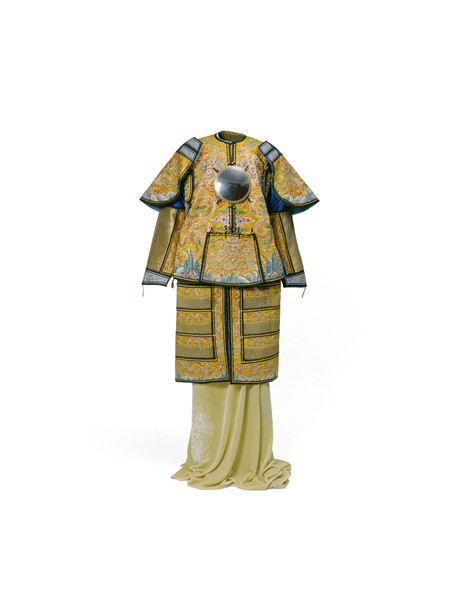Emperor Qianlong's southern belle
By Zhao Xu ( China Daily ) Updated: 2017-09-16 07:34:16
 |
|
Emperor Qianlong's ceremonial garments. [Photo provided to China Daily] |
On view at the exhibition are two pages of writing titled "Five Poems on Eight Sights along the West Lake", which Qianlong wrote in 1784, during his sixth and final visit to Hangzhou.
The value of the two pages, Ma says, resides in the fact that they were drafts, so faithfully reflect the author's thought processes, at least in part.
"Another thing is that rather than leaving his works to open interpretation, the emperor insisted on getting his true thoughts through. What he did was to fill the space between lines with explanatory notes. It's like saying: 'This is what I intend to say. Don't get me wrong.' The emperor was certainly not one to appreciate abstruse beauty."
"The eight sights mentioned here were all from the emperor's palace in Hangzhou, built in 1750, one year before his first visit. And as a man of means, he extended his passion for the beauty around him easily from page to reality, once he had returned to Beijing. Constructions of temples, mini-palaces and bridges took place in Yuquan Mountain in the capital's western suburb, to conjure up a view similar to the one that Qianlong encountered in Hangzhou's Shengyin Temple.
But nothing was more telling than the retirement garden Qianlong built for himself inside his grand royal palace in Beijing - the Forbidden City (now the Palace Museum). The garden, in the northeastern corner of the Forbidden City, was completed in 1776 and features buildings with sophisticated interior design, clearly influenced by the Jiangnan style.
Yet Qianlong never spent a single day in his garden of retreat. Officially handing over the crown to his son, Emperor Jiaqing, in 1795, he stayed in the center of power for four more years, until his death in 1799.
During Qianlong's last visit to Hangzhou in 1784, near the end of his final trip to Jiangnan, he turned 73. And the emperor, who prided himself on his many military achievements, inspected his Manchu trooped stationed in Hangzhou. (The Qing rulers were of Manchu origin, a horseback minority group from northeastern China.)
"Zhejiang was one of the few places where the Qing court trained their navy," Le says. "But the Manchu soldiers, having been pampered for so long thanks to their special status, had long been disconnected with their horseback tradition."
According to the record, during that inspection, some Manchu soldiers, despite their eagerness to impress the emperor, failed disastrously in archery.
|
|
|
|
|
|
|
|

























 Raymond Zhou:
Raymond Zhou: Pauline D Loh:
Pauline D Loh: Hot Pot
Hot Pot Eco China
Eco China China Dream
China Dream China Face
China Face






